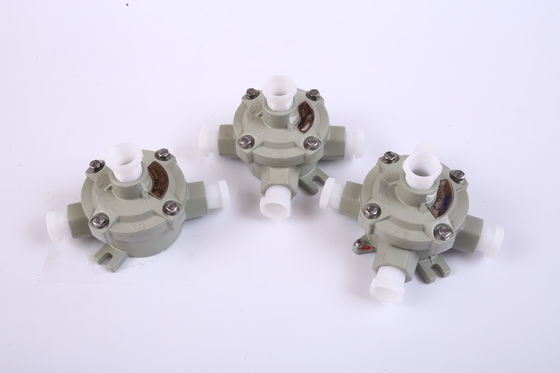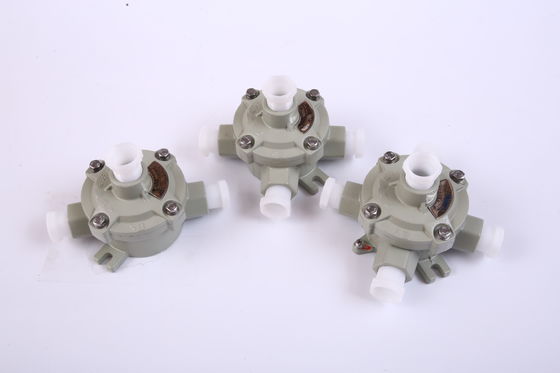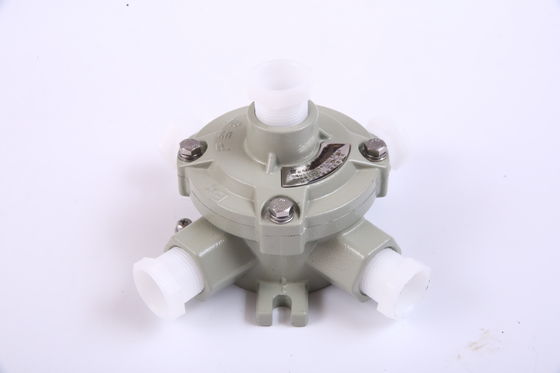Product Description:
The Ex Mark for this Vapour Proof Junction Casing is Ex Db IIC T6 Gb/ Ex Tb IIIC T80°C Db, indicating its suitability for use in potentially explosive atmospheres. The sturdy enclosure material of this Explosive Safe Junction Box is made of durable Aluminum Alloy, ensuring durability and reliability in harsh conditions.
With a water resistance rating of IP66, this Vapour Proof Junction Casing provides protection against powerful jets of water and ingress of dust, making it suitable for use in challenging outdoor environments.
Whether installed in hazardous locations or industrial settings, the Explosion Proof Junction Box offers a secure and reliable solution for housing electrical connections and components. Its robust construction and adherence to safety standards make it an essential component in ensuring the integrity of electrical systems in volatile environments.
When it comes to ensuring safety and reliability in hazardous areas, the Explosion Proof Junction Box is the ideal choice. Its Ex certification and rugged design guarantee protection against the risks associated with flammable substances, making it a crucial component for maintaining operational efficiency and safety in industrial applications.
Features:
- Product Name: Explosion Proof Junction Box
- Installation Method: Wall
- Enclosure material: Aluminum Alloy
- Dust Proof: WF2
- Cable Entry: G1/2
- Type: Junction Box
Technical Parameters:
| Technical Parameter |
Details |
| Used |
Oil&Gas Chemical Plant; Paper Mill; Manufacturer |
| Entry No |
See Illustration |
| Ex Mark |
Ex Db IIC T6 Gb/ Ex Tb IIIC T80°C Db |
| Voltage |
220V/380VAC |
| Cable Entry |
G1/2 |
| Overall Dimension |
Customer Settings |
| Item Type |
Explosion-Proof Flameproof Junction Box |
| Water Proof |
IP66 |
| Use Area |
Zone1,2; Hazardous Area; Oil&Gas Industry |
| Installation Method |
Wall |
Applications:
1. Gas stations - During the refueling and unloading process, gasoline can easily evaporate, forming flammable vapors. These vapors, when mixed with air and exposed to sparks, can explode.
2. Chemical plant reaction rooms - During the production process, pipes and valves may leak flammable and explosive gases or solvent vapors such as benzene, alcohols, and ethers.
3. Coal mine tunnels - Coal seams continuously emit methane (gas), and mining operations generate large amounts of combustible coal dust, creating a typical explosive environment.
4. Flour mill grinding rooms - Grain processing generates airborne flour dust, which, when reaching a certain concentration, can cause a dust explosion when exposed to an ignition source.
5. Automotive paint spray booths - Paint mist and solvent vapors emitted by thinners (such as thinner) used during spraying are both flammable and explosive.
6. Gas boiler rooms/pressure regulating stations - Natural gas (primarily methane) pipelines and valves may leak, and accumulation can create an explosive atmosphere.
7. Alcohol/Liquor Bottling Plant - Alcohol (ethanol) is highly volatile. In a confined space, its vapor can form an explosive mixture when mixed with air.
8. Aluminum/Magnesium Alloy Grinding and Polishing Plant - Aluminum and magnesium powders generated during processing are flammable metal dusts that can explode violently when exposed to open flames or high temperatures in air.
9. Anaerobic Tanks in Sewage Treatment Plants - The sewage treatment process produces methane (primarily methane) as a byproduct, which can easily accumulate in tanks or pumping stations.
10. Solvent/Paint Warehouses - Flammable liquids (such as toluene) stored in centralized locations continuously evaporate, and vapor concentrations can easily reach explosion limits in the absence of adequate ventilation.

 Your message must be between 20-3,000 characters!
Your message must be between 20-3,000 characters! Please check your E-mail!
Please check your E-mail!  Your message must be between 20-3,000 characters!
Your message must be between 20-3,000 characters! Please check your E-mail!
Please check your E-mail! 




